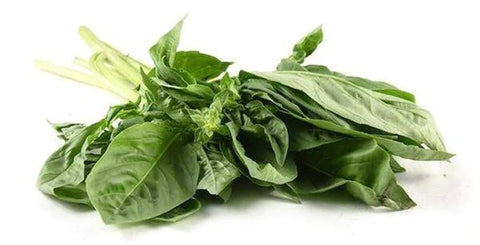101: How to Cook with Fresh Herbs

Have you ever been talking to friends and asked how to cook a particular vegetable? Some may pull out their phone to look up helpful recipes, or you may get the old standby: “How do I prepare this?” “Oh, I just sauté it with a little butter and garlic.”
While that does work for almost any vegetable, it also limits the possibilities we might consider for whatever's in season at the time. Because, as we all know, what doesn’t taste good with butter and garlic? Heck—foam pellets would be good with garlic and butter, right? I kid, of course, but you can see where I'm going with this.
One area of culinary knowledge that I find many people lack is the use of fresh culinary herbs: what they are, how to use them, and how to store them, as well as just how valuable they can be in our cooking adventures!
As it’s October—sort of the unofficial start to the indoor cooking season for me—I thought I would look around and see if there are any good resources for us to gather some herb info and learn some of the benefits of these wonderful kitchen companions. And with Thanksgiving right around the corner and herbs being part of most holiday recipes, the timing couldn’t be better! Here are some interesting tips to get you started.
- Fresh herbs are what change basic foods into favored dishes. They are the secondary seasonings that develop and extend the natural flavors of our raw materials.
- Use three times as much fresh herbs as dried herbs that recipes might call for.
- Fresh herbs have subtle and delicate flavors. Prolonged cooking causes them to lose their fragrance and their flavor. Add the fresh herbs near the end of the cooking time.
- Fresh herbs enhance cooking water for vegetables. Chop and drop them into the water so they'll be part of the finished dish, or tie them in a little cheesecloth bag and remove them before serving.
- Fresh herbs can add wonderful character and pleasantly surprising complexity to breads. A general rule of thumb is to add somewhere between 1 to 2 tablespoons of chopped fresh herbs per one-pound loaf.
Since herbs are new to many of us, we may not use all of our herbs in a timely manner. One thing to keep in mind if you are planning to dry your herbs is that fresh herbs often have more flavor than dried ones, but dried herbs may seem stronger because their flavors are more concentrated.
- Dry fresh herbs by tying them in bundles and hanging them upside down in a dark, warm, dry spot. Darkness is important, as too much sunlight will decrease an herb's flavor. If you don't have such an area, you can use brown paper bags. Tie the bag around the herb bunches (suspending them in the bags). Store the bags in a warm, dry place for several days (check daily for progress; store when completely dried). Another interesting fact is that drying herbs destroys their antioxidant properties, so you might want to consider freezing them instead. If you would rather freeze them, then try this method:
- For freezing, wrap fresh herbs in Ziploc bags for storage. Be sure to blanch leafy herbs such as basil before freezing. Sturdier herbs like rosemary freeze exceedingly well.
Here are a couple of great recipes to get you started with your fresh herbs.
If you have a hard time remembering the herb traits, consider wearing some fresh rosemary around your neck—that’s what the ancient Greeks used to do when taking exams and wanted to concentrate better.
Now, let’s begin the indoor cooking season with a fresh new approach!

